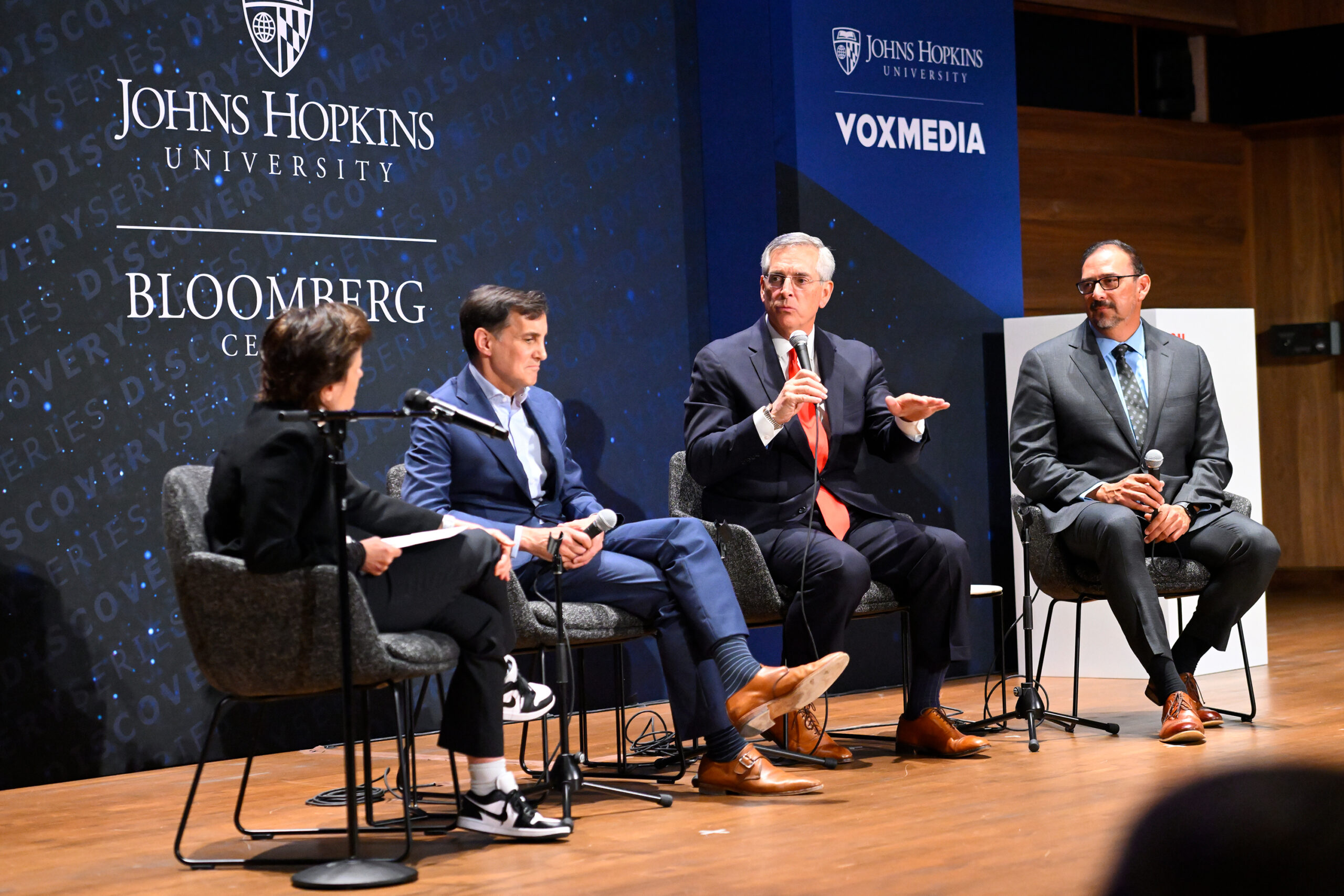What to know about AI and the upcoming elections
OpenAI’s Mira Murati and the secretaries of state from Arizona and Georgia weigh in on challenges, opportunities, and threats posed by emerging technology

- Image Will Kirk
Adrian Fontes, Arizona’s secretary of state, calls the election role-playing exercise he coordinated to prepare for the coming elections, “Dungeons & Dragons for election administrators.”
The program brought together election officials, vendors, law enforcement members, and officials from local, state, and federal agencies to consider scenarios that could affect voting, including an AI-generated video of Fontes sharing false information.
“We could make folks familiar with the fact that [deepfake AI videos] exist. Here’s what it looks like, smells like, tastes like, so that if it does emerge during the actual election season, they won’t be surprised by it,” Fontes said during a recent event held at the Johns Hopkins University Bloomberg Center.
Also see
OpenAI’s Mira Murati is optimistic about AI. Should she be?
Veteran tech reporter Kara Swisher offered Mira Murati, OpenAI’s chief technology officer, a piece of advice she’s offered to many tech company leaders before during a recent taping of her podcast, On with Kara Swisher, at the Johns Hopkins University Bloomberg Center.
“If you’re in a ‘Black Mirror’ episode, maybe you shouldn’t make it,” Swisher said, invoking Netflix’s show that explores the dark side of technology. Swisher’s comments came after she described a forthcoming OpenAI tool capable of recreating a person’s voice based on a 15-second recording.
Murati resisted on Swisher’s assessment, calling it a “hopeless approach.” She added, “These technologies are amazing, and they have incredible promise. We can get this right.” Read more
Q+A: How election experts are thinking about the 2024 elections
Nearly half the world’s population are expected to vote in 2024 as more than 60 countries around the globe hold elections. Looming over those votes is the potential use of artificial intelligence to disrupt campaigns and elections.
Scott Warren, a visiting fellow at the SNF Agora Institute at Johns Hopkins University and a visiting fellow at the German Marshall Fund (GMF), recently attended a convening of global election officials held in Brussels. There, he heard about their efforts to prepare for an AI-fueled election season. Read more on the Hub
Kara Swisher launches AI interview series at Hopkins Bloomberg Center
Journalist Kara Swisher will interview OpenAI’s Mira Murati on Monday, June 10, as the inaugural guest of a four-part live event series hosted at the Johns Hopkins University Bloomberg Center in Washington, D.C.
Each of the four live events in the new Discovery Series will focus on a different AI-related issue and feature Swisher recording an interview with a topic-specific guest for her podcast, On with Kara Swisher, and a panel discussion moderated by Swisher with leading experts from Hopkins and other organizations. Read more
Expert perspective: We need to accelerate and broaden AI research
K.T. Ramesh, a professor in Johns Hopkins University’s Department of Mechanical Engineering, has studied everything from materials design to asteroids over his three decades at the university.
He’s now applying artificial intelligence to those areas of study, as well as the mitigation of traumatic brain injury. Additionally, Ramesh is the interim co-director of the JHU Data Science and AI Institute, which is focused on interdisciplinary artificial intelligence and its applications.
We spoke with Ramesh about the institute, his research, and the state of AI more broadly. Read more
Fontes was joined by his counterpart in Georgia, Brad Raffensperger, and Johns Hopkins University President Ron Daniels for a panel discussion about AI and the coming election, moderated by veteran tech reporter Kara Swisher. Following their conversation, Swisher interviewed Mira Murati, OpenAI’s chief technology officer. The event was the first of four in a yearlong partnership between JHU, Swisher, and Vox Media that kicks off the new Discovery Series at the Hopkins Bloomberg Center.
Here are four key takeaways from their conversations:
- Media literacy remains key
Daniels spoke of Johns Hopkins students—young people who are internet natives—learning how to assess the information they see online. “It’s about giving them the power of discernment,” he said. “There is this deluge of information, but I think there is still the capacity to help them navigate this environment and to be able to identify materials, identify sources that are more reliable and that they should act upon, whether as a voter or even in terms of their basic coursework.”
- Democracy is good for business
Fontes urged private companies to do their part to support free and fair elections and democratic principles, not for moral reasons, but for business ones. “Find me a totalitarian or authoritarian regime where entrepreneurs can thrive,” Fontes said.
- A focus on bolstering trust
Georgia has had a number of contested elections in recent years, leaving both Democrats and Republicans skeptical. Raffensperger said he’s countered this by taking a “belt and suspenders” approach to ensuring election integrity, through a combination of logic and accuracy testing before voting and equipment monitoring across precincts during voting.
- A three-pronged approach
Murati said OpenAI, the company behind ChatGPT, has three focus areas when it comes to protecting election integrity:
- Preventing abuse by monitoring the platform and taking quick action as necessary.
- Reducing political bias, after receiving criticism that ChatGPT is too liberal.
- Pointing people toward correct information about voting.